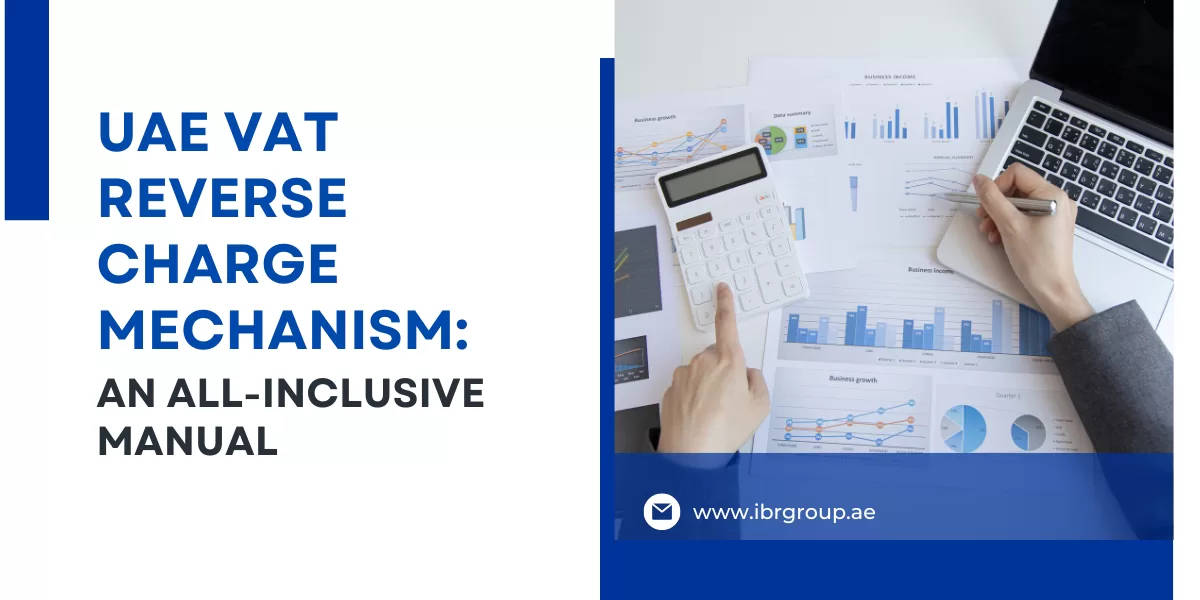
UAE VAT Reverse Charge Mechanism: A Manual
UAE VAT Reverse Charge Mechanism: An All-Inclusive Manual
In the case of UAE VAT, the Reverse Charge Mechanism (RCM) transfers the liability for VAT payment from suppliers located abroad to recipients within the UAE who receive goods or services. It guarantees adherence to VAT regulations on imports, particularly when the supplier lacks VAT registration in the UAE. RCM is applicable to imports from outside the UAE, acquisitions from designated zones, and certain high-value items such as gold and oil. Under RCM, businesses are required to accurately document and report VAT. This simplifies compliance for foreign suppliers and helps prevent VAT fraud. To avoid penalties, it is essential to stay informed about updates and keep accurate records for compliance.
The Reverse Charge Mechanism (RCM) plays a vital role in the UAE VAT framework, aiming to simplify VAT collection on cross-border transactions and guarantee compliance for imports. In contrast to the conventional VAT procedure in which the supplier bills the customer for VAT, RCM transfers the obligation of reporting and remitting VAT from the supplier to the purchaser or recipient of goods or services. This mechanism is crucial for businesses that import goods or services into the UAE, as it affects their VAT accounting on transactions with foreign suppliers.
Legal Structure of RCM in UAE VAT
Article 48 of Federal Decree-Law No. 8 of 2017 on Value Added Tax establishes the foundation of the RCM in UAE VAT. This legislation specifies the conditions for the application of RCM and describes the transfer of VAT payment responsibility from suppliers (often located outside the UAE) to recipients within the UAE. The UAE guarantees a strong VAT collection on imports that could otherwise evade taxation due to the supplier’s non-residency status by requiring the recipient to account for VAT directly to the Federal Tax Authority (FTA).
Applicability of RCM within the UAE
RCM is relevant to a wide variety of transactions, particularly those involving the importation of goods or services into the UAE, or specific supplies made domestically under certain criteria. Essential scenarios comprise:
• Imports from Outside the UAE: RCM applies when a business registered for VAT in the UAE imports goods or services from a supplier located outside the UAE. This encompasses dealings with suppliers from both GCC and non-GCC countries who do not have VAT registration in the UAE.
• Aquisitions from Designated Zones: Some transactions involving products acquired from designated zones within the UAE are subject to RCM, as long as the recipient is VAT-registered in the UAE.
• Supply of Gold, Diamonds, and Other Specified Goods: The RCM rules specifically designate the supply of certain high-value items such as gold, diamonds, crude/refined oil, and hydrocarbons. These products frequently entail cross-border dealings, with RCM guaranteeing that VAT is recorded by the recipient located in the UAE.
The UAE VAT system simplifies the administrative burdens on foreign suppliers by mandating RCM for these specific transactions and effectively shifting VAT compliance to the local recipient.
How RCM Functions in Real-World Applications
To ensure effective compliance with VAT regulations, businesses must grasp how RCM operates. Here’s a detailed overview:
1. Transaction Takes Place: A business in the UAE that is registered for VAT acquires goods or services from a foreign supplier who does not have VAT registration in the UAE.
2. Shifting VAT Liability: With the implementation of RCM, it falls to the recipient in the UAE to account for the VAT on this transaction. The invoice from the foreign supplier does not include VAT.
3.Documentation and Reporting: The recipient documents the VAT on their VAT return as both input and output VAT, which typically results in a neutral effect on the business’s cash flow if the input tax can be completely reclaimed.
4.Compliance Requirements: The business must provide proper documentation, like invoices that explicitly indicate the use of RCM, and keep precise records for VAT returns.
Benefits of RCM
• Facilitated Adherence for Non-Resident Suppliers: By removing the requirement for foreign suppliers to register for VAT in the UAE, RCM lightens administrative loads and promotes trade.
• Prevention of VAT Fraud: The RCM assigns the responsibility for VAT to the recipient based in the UAE, which aids in preventing revenue loss and diminishes the likelihood of fraudulent VAT claims by suppliers who are not residents.
• Facilitates Cross-Border Trade: RCM simplifies VAT compliance for imports, easing the process for UAE businesses to interact with international suppliers without imposing complex VAT registration requirements on those suppliers.
Procedures for Companies to Comply to RCM
UAE businesses should take the following steps to ensure compliance with RCM:
1. Confirm VAT Registration: Make sure the recipient business is registered for VAT in the UAE.
2. Identify Relevant Transactions: Examine purchases to ascertain the applicability of RCM, with an emphasis on imports and certain goods/services specified by RCM regulations.
3. Ensure Appropriate Documentation: Maintain thorough records of every transaction subject to RCM, including invoices that explicitly indicate the application of RCM.
4. Precise VAT Reporting: Incorporate RCM transactions in VAT returns, ensuring to account for both input and output VAT as necessary.
5. Consult Experts: Think about employing VAT consultants to help you deal with complicated RCM situations and guarantee adherence to UAE VAT regulations.
